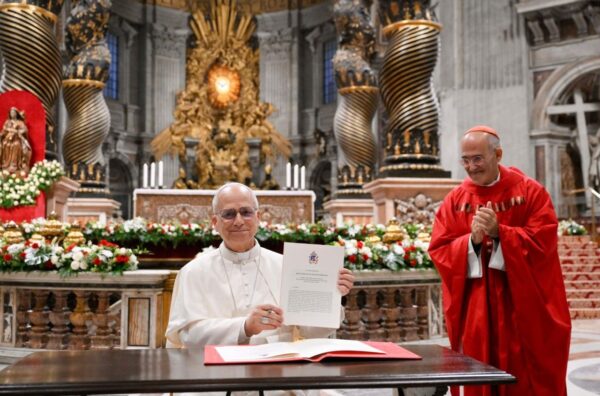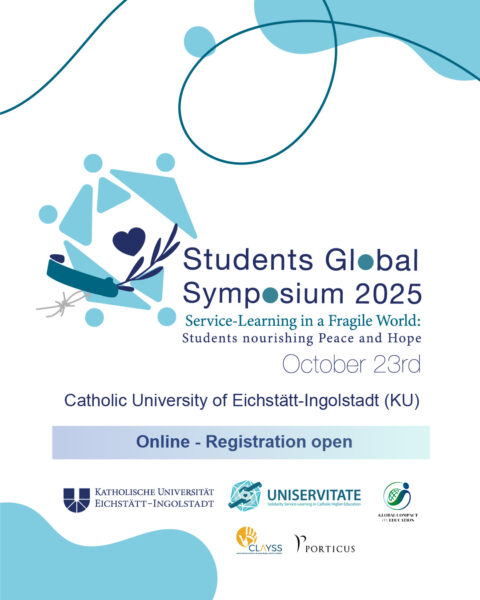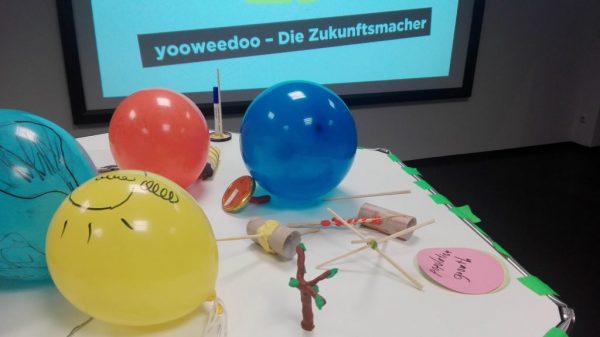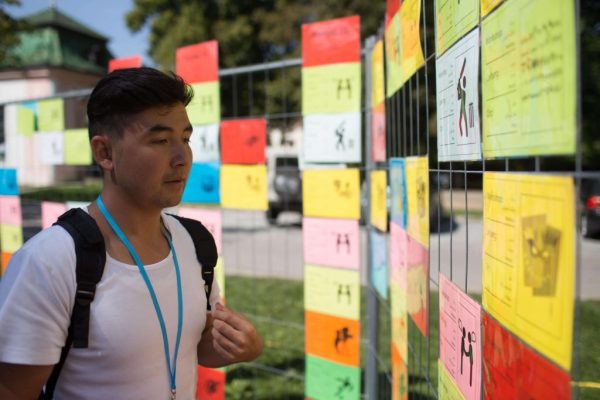
The VI Uniservitate Global Symposium was held in a hybrid format on 6th and 7th November at the Catholic University of Eichstätt-Ingolstadt (Germany). More than 500 participants from 55 countries took part in this meeting, bringing together leaders from Catholic universities and international academic networks to discuss the theme “Service-Learning in a Fragile World: Universities Nourishing Peace and Hope”.

Rector, Gabriele Gien and Vice-Chancellor, Klaus Stüwe in the Opening Session.
It was organized by Uniservitate—a global network promoted by CLAYSS with the support of Porticus—and the host, the Catholic University of Eichstätt-Ingolstadt, which coordinates the Uniservitate hub for Central and Eastern Europe and the Middle East. Over those two days, panels and discussion forums emphasized how the service-learning approach helps address the current challenges facing humanity with hope.
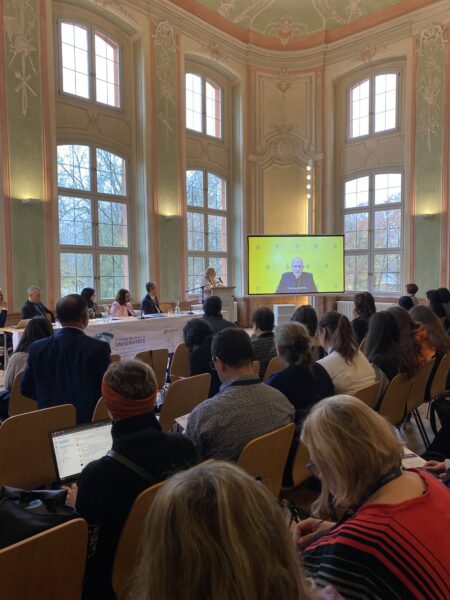
Cardinal José Tolentino de Mendonça, Prefect of the Dicastery for Culture and Education in his virtual participation in the symposium
The Cardinal José Tolentino de Mendonça, Prefect of the Dicastery for Culture and Education, sent a video message stating that the “Universitate symposia have become an essential benchmark for those in the academic world who understand that education is not limited to knowledge transfer but reaches its full potential in the act of service.” He added that service-learning fully embodies the calling to educate for service —and through service— because “serving is not an appendage of the educational process, but its beating heart.”
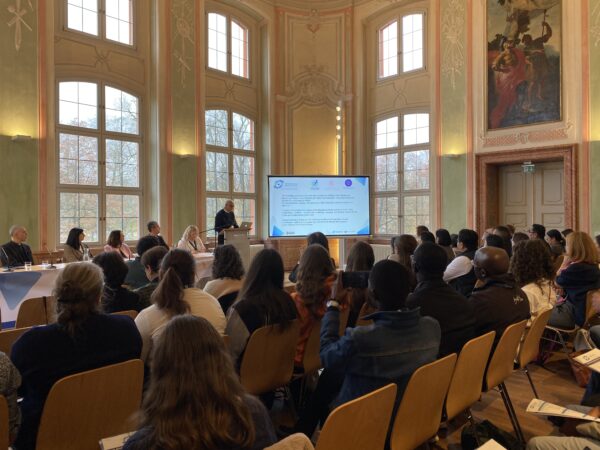
Coordinator of the Global Compact on Education, Father Ezio Bono
His message was introduced by the coordinator of the Global Compact on Education, Father Ezio Bono, who was present in Eichstätt. In addition, he highlighted that Pope Francis “explicitly referred to service-learning” in his Apostolic Letter Drawing Maps of Hope, describing it as one of the most promising ways to combine knowledge and solidarity, intellect and compassion.
Nieves Tapia, founder and Director of CLAYSS, reminded us that education is truly transformative when it is rooted in solidarity and service: “Service-learning has been very important in the last century, but now it is more important than ever, because it provides the kind of education that you cannot find in ChatGPT or any artificial intelligence we use.”
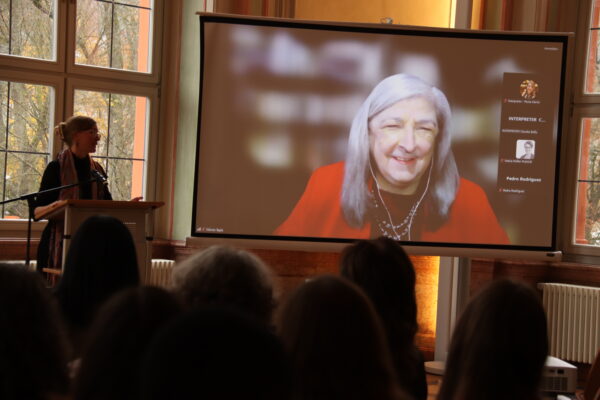
Nieves Tapia, founder and Director of CLAYSS, Key speaker during the VI Global Symposium
Richard Broose from Porticus stated that the pedagogy of service-learning works “from fragility towards peace and hope,” explaining that “service-learning teaches us that opening ourselves up to our communities’ wounds gives meaning to our knowledge and generates hope.”
María Rosa Tapia, Coordinator of Uniservitate, was also present in Eichstätt, alongside Andrés Peregalli, vice coordinator, and Candelaria Ferrara, coordinator of regional hubs. She celebrated the consolidation of this global network, which currently includes some 150 universities. “We know that we live in a fragile world, but through service-learning, we are nurturing peace and hope,” she said, “adding that all regions of the world are drawing ‘a map of hope.’”
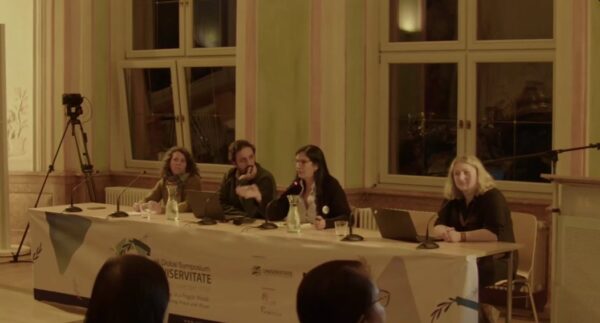
María Rosa Tapia (Coordinator of Uniservitate), Andrés Peregalli (vice coordinator)
and Candelaria Ferrara, coordinator of regional hubs with Olha Mykhailyshyn (coordinator of the Central and Eastern Europe and Middle East hub)
The host university’s Rector, Gabriele Gien, emphasized that the exchange fostered in this symposium “is good for the intellect but also for the heart,” while Vice-Chancellor Klaus Stüwe stressed that “academic work gains value when it addresses real social, environmental, and cultural needs” and recognized the role of Uniservitate as “a platform that encourages international exchange.” In turn, Olha Mykhailyshyn, from that university and coordinator of the Central and Eastern Europe and Middle East hub, noted that “the spirit of service-learning knows no borders.”
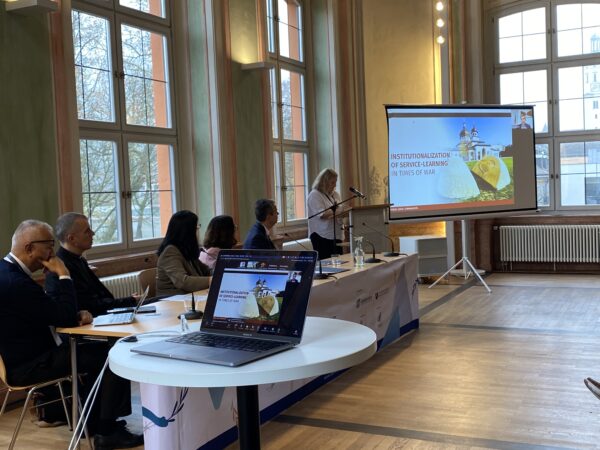
More than 500 participants from 55 countries took part in this meeting
The rector of the Catholic University of Ukraine, Taras Dobko, shared his institution’s experience in times of war, with 86% of the students participating in voluntary service. He stated that “when everything around us is uncertain, values and principles become solid ground to stand on, helping people to focus not only on survival but also on the victory of good, establishing dignity, showing solidarity, and caring for the common good. That is why participating in service-learning before the full-scale invasion was a crucial decision for our university; it prepared our community to endure the turbulence of war.”
Father Delmar Cardoso of the Catholic University of Pernambuco (Brazil) defined service-learning as “a pedagogy of resilience that teaches those who serve and those who receive the service to transform themselves.” He added: “Resilience is not developed in isolation but in community, and in a world where selfishness, individualism, and immediacy are ever-present, [service-learning] has proven to be an important tool for proposing an existence based on listening, presence, encounter, and dialogue.”
Brother Alejandro González Cerna, from Bethlehem University (Palestine), emphasized that “service-learning enables students to experience the reality of life, allowing them to discover that no one is so poor to have nothing to give, nor so rich to have nothing to need.”
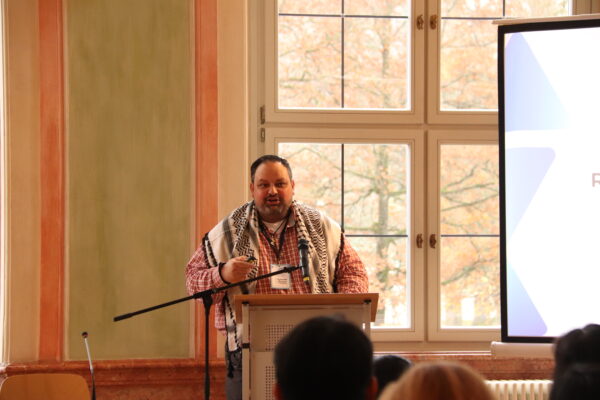
Brother Alejandro González Cerna, from Bethlehem University (Palestine)
Professor Martin Bahati, from Loyola University in Congo, explained how universities in the African Great Lakes region work for peace after decades of conflict: “Service-learning shows how to use knowledge to serve society; universities are strategic spaces for healing and reconciliation.”
Miao-Ju Chwo, director of the Service-Learning Centre at Fu Jen Catholic University in Taiwan, shared her institution’s methodology. It focuses on fostering empathy and flexibility: “Our students learn to face uncertainty and to change. They know they are not alone and are part of a community that learns by serving.”
The contribution of Father Ezio Bono was prominent. After visiting the Abbey of Saint Walburga, a few minutes from the University, he changed his prepared speech based on the life of the Benedictine nun, born in the 8th century in the Bavarian region and a symbol of dialogue and service in this area. “In a fragmented world, we need educators who can show the way, not to control, but to provide spaces for respect and dialogue. Walburga did it with firmness and gentleness, embodying an inclusive and prophetic educational leadership,” he said.
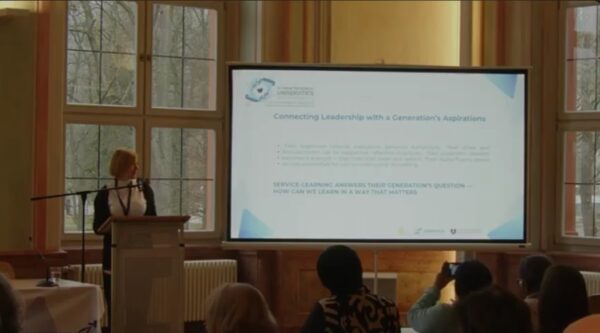
Alžbeta Brozmanová Gregorová, Mariana Humenna, Bakashaba Mark and Verona Eilika Pircher in the plenary sesión “Students nourishing Peace and Hope”
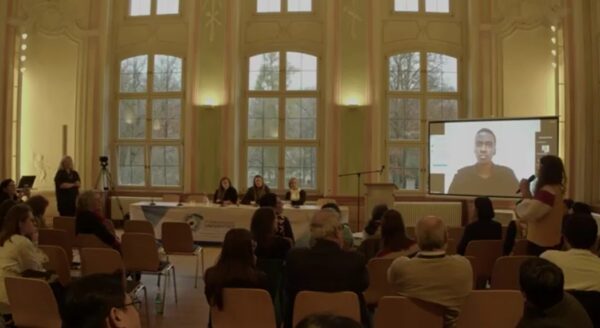
In addition, the conclusion of the Global Symposium for Students, held on 23rd October, was presented virtually, with more than 300 young people from all over the world. Following a dissertation on the students’ experiences by Alžbeta Brozmanová Gregorová, a lecturer at Matej Bel University in Slovakia, the results of the symposium were presented by the three young people as co-moderators: Mariana Humenna and Verona Pircher, from the Catholic University of Eichstätt-Ingolstadt, and Bakashaba Mark, from the University of Kisubi, Uganda.
The students emphasized that serving others helps them understand their identity and the purpose of what they learn. Besides, service-learning teaches them that peace is built with specific gestures of empathy and collaboration. For instance, Mariana Humenna stated that “service-learning is not just a program; it’s a way of seeing life, a possibility of finding oneself through service to others; some become braver, others learn to listen, some feel part of a global community, and some find meaning in their profession, but everyone receives more than they give.”
Father Peter Balleis, Executive President of Jesuit Worldwide Learning; Markian-Illia Mykytchyn, Vice-Rector of the Collegium Orientale; and Carol Ma Hok Ka, from the Singapore University of Social Sciences, also spoke, alongside those already mentioned. The opening of the symposium featured encouraging messages from Nicolas Standaert, president of EASLHE; Karl-Heinz Gerholz, from the University Network for Social Responsibility; and Father Michael Alberter, from the Diocese of Eichstätt.
In addition to the plenary meetings, service learning leaders from different countries shared their experiences and exchanged concerns in simultaneous sessions on research (on Thursday) and the Global Compact on Education (on Friday). The research sessions addressed key thematic areas of the network’s work: institutionalisation, spirituality, and impact on students and networks. In relation to the Global Compact on Education, sessions were held on dignity and human rights, fraternity and cooperation, technology and integral ecology, education and the promotion of peace and citizenship, culture and religions. At the close of the session dedicated to the contribution of service-learning to the construction of citizenship and peace processes in diverse contexts, Father Bono affirmed that this theme is one of the central axes of the Global Compact on Education and invited participants to connect continents and countries, recognising that each local reality develops its own education pact — such as those in Africa or Argentina — and that the challenge is to inculturate the Pact, that is, to bring it to life in each context, respecting cultural and social particularities. He also recalled that service and educational institutions are the concrete spaces where relationships are built in networks. ‘There, the spirit of the Compact is embodied: to educate through collaboration, care and fraternity,’ he said.
Both the Eucharist with the Collegium Orientale and a meeting with rectors and authorities from 40 member institutions of Uniservitate were celebrated as part of the Symposium.
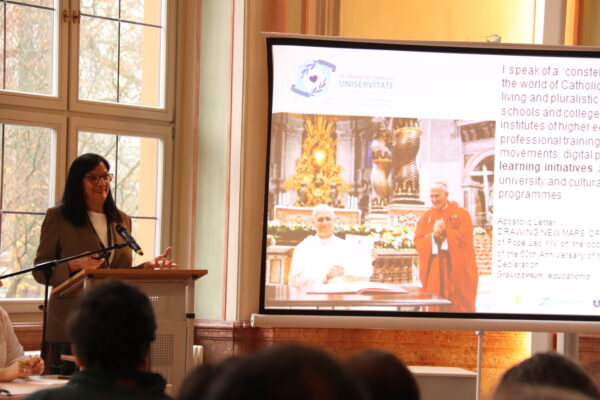
Maria Rosa Tapia sharing in his presentation the signing of Pope Leo XIV’s Apostolic Letter on education
All the speeches, discussions, and experiences were weaving “constellations of hope,” in the words of Pope Leo XIV in his recent Apostolic Letter on education. “The experience over these days is summarized in a solid academic event, where faith was celebrated in community while sharing fraternity in joy and hope,” said Andrés Peregalli. María Rosa Tapia considers that the VI Uniservitate Global Symposium was “a long-held dream” and the “fruit of years of joint work by a community that didn’t stop even during the pandemic,” a community where “every institution, educator, and student is a star shining on its own, but together they are a constellation that can point a course for the future of education.”
The discussions of the VI Symposium will be available on the Uniservitate website in both English and Spanish.






